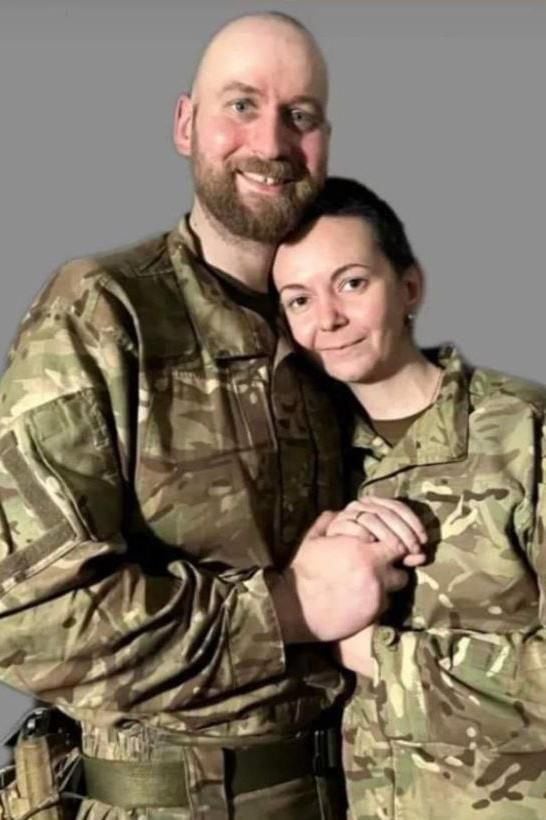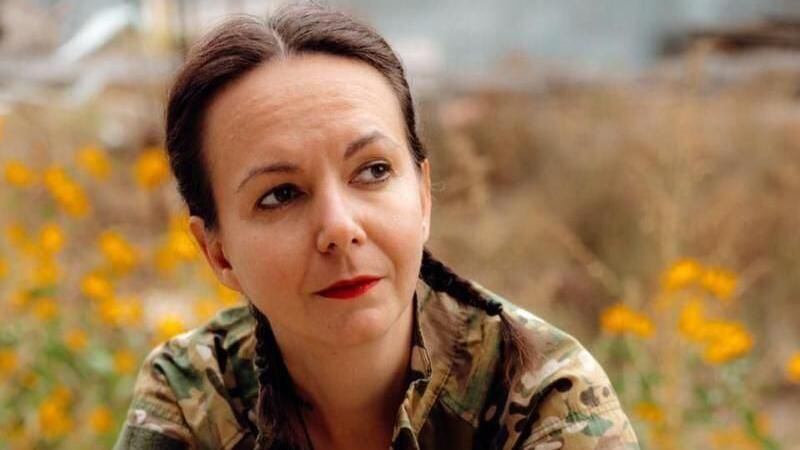:quality(75)/cloudfront-us-east-1.images.arcpublishing.com/elcomercio/RGXN2IJUK5ACBD5AIR77VBPTJU.jpg)
“He made rings out of aluminum foil and asked me to marry him. Of course, I said yes,” recalled Valeria Subotina.
“She was the love of my life. Our rings were just perfect,” she said.
LOOK: Russians look for their dream home in the new buildings of Mariupol, the Ukrainian city destroyed and occupied by Moscow
Valeria and her partner, Andriy Subotin, 34-year-old captain in the Ukrainian army, planned to get married in Mariupolin the south of UkraineBefore the war.
They dreamed of having a big party with friends and family.
But soon after the full-scale invasion began, the Russian army rushed to that strategic port city and surrounded it in a matter of days.
It was early March 2022.
Mariupol was the target of constant Russian bombings, the streets were on fire, there was no food, electricity, water or single exit.
The siege lasted almost three months. Tens of thousands of civilians are believed to have been killed.
Many Mariupol residents desperately sought shelter at the Azovstal steelworks, where there were more than 30 bomb shelters.
They were built in the Soviet era as protection against a much-feared potential nuclear war.
It was there that Valéria got married and became a widow in just two days..
“On the brink of starvation”
Valeria was a poet when the Russian invasion of Ukraine began.
Shortly afterwards, she became press officer for the Azov Brigade, a part of the Ukrainian National Guard that generated controversy for its alleged association with far-right groups, a claim that Azov himself denies.
As the Russian offensive on Mariupol intensified, Ukrainian troops had to retreat to the Azovstal factory bunkers along with civilians.
The entrance to the bunkers looked like a hole and you had to go down several partially collapsed stairs, recalled Valéria.
“You moved through passages and tunnels and went deeper and deeper into the ground, until you reached a concrete cube, a kind of safe room,” he said.
In the bunkers, people built makeshift kitchens, where they prepared whatever food they could with whatever they found.
If it was flour, they prepared the dough and made cakes.
“We called it bread, but it was just cakes of flour and water. That’s how we survived. It was almost a famine,” said Valéria.
“We were like rats, gathering everything we found. We slept on rags or clothes.
“Some places were completely dark, but your eyes got used to it and you started to think it was normal. Of course, there was nothing normal about our lives at that time.”
On April 15, 2022, a large aerial bomb fell on the plant and Valéria was injured.
“They found me among the corpses, the only one who was alive. It was a miracle, but also a terrible tragedy.”.
Suffering from a severe concussion, Valeria had to spend eight days in the Azovstal underground hospital, where she was treated among hundreds of soldiers with amputated limbs scattered throughout.
“They couldn’t get adequate help because there were few medicines. The smell of blood and rot was everywhere,” he said.

Valeria’s partner Andriy was also stationed in Azovstal.
Shortly after his injury, he proposed to her right there in the bunkers.
On May 5, 2022, the couple signed the required documents and sent scanned copies to Kiev for Andriy’s parents, who appealed to the civil registry office to officially end the marriage.
In her ceremony in the bunkers, she wore her military uniform as her wedding dress and her rings were made from aluminum foil.
Andriy promised Valeria that he would buy her a suitable wedding ring as soon as the war ended.
But on May 7, the man died while carrying out a combat mission in the region.
“People talk about the feeling they have when a loved one dies, but I’ve never felt anything like that,” explained Valéria.
“In fact, the day Andriy was killed [antes de recibir la noticia de su muerte] I was in a good mood. “I had just gotten married and I was in love.”
When she learned of her husband’s death, she didn’t cry, but kept it all inside, she said.
“There, in Azovstal, a day was like a year.
“First I was a girlfriend, the next day I was a wife, and the next day I became… I’m afraid to even say the word.”
Prisoners of war
In early May 2022, thousands of Ukrainians who took refuge in the Azovstal steel plant and managed to survive without food and medicine for 80 days needed to be evacuated immediately.
Initially, civilians were allowed to leave the factory. The soldiers were then taken prisoner by the Russian army.
There were hopes they would be released as part of a prisoner exchange deal.
But after more than two years, thousands of Ukrainian soldiers, including the nearly 900 members of the Azov Brigade, whom many in Ukraine consider national heroes, remain in Russian hands.
Their families organize regular protests to call on Ukrainian authorities to do more to exchange them.
The process of exchanging prisoners of war is complicated.

Nearly 3,000 Ukrainian prisoners of war have been released by Russia in prisoner exchanges since the invasion began.
More than 10,000 are believed to remain in Russian custody.
A recent United Nations investigation documented that Ukrainian prisoners of war were subjected to merciless beatings, electric shocks, rape, sexual violence and mock executions.
Valéria was also held captive for 11 months. He went through torture and abuse, he said. He recently published a book about his time in prison.
The body of her late husband Andriy remains at the Azovstal steelworks.
“[Los rusos] They killed and destroyed everything I loved: my city, my friends and my husband“, am sorry.
Source: Elcomercio
I am Jack Morton and I work in 24 News Recorder. I mostly cover world news and I have also authored 24 news recorder. I find this work highly interesting and it allows me to keep up with current events happening around the world.






